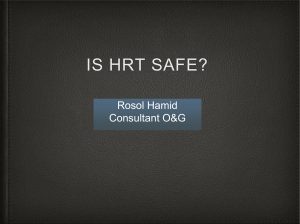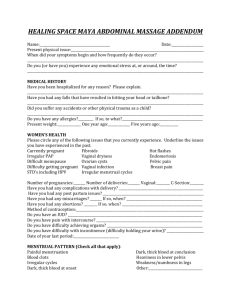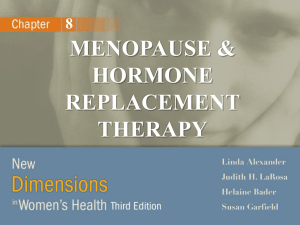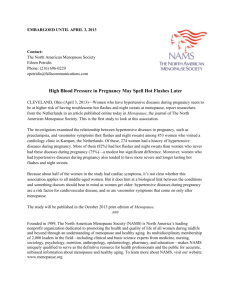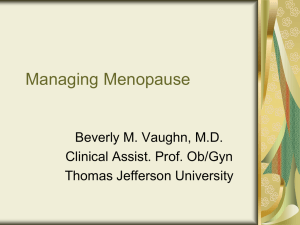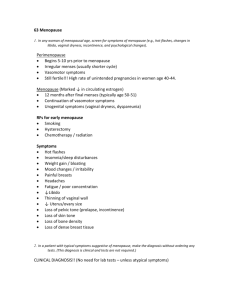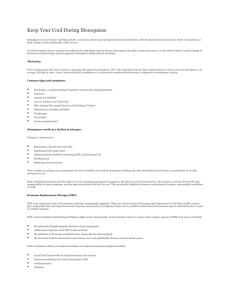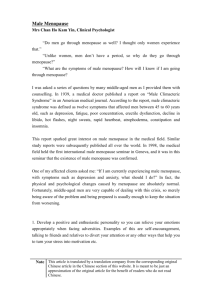Natural Solutions to the Menopause and Beyond
advertisement
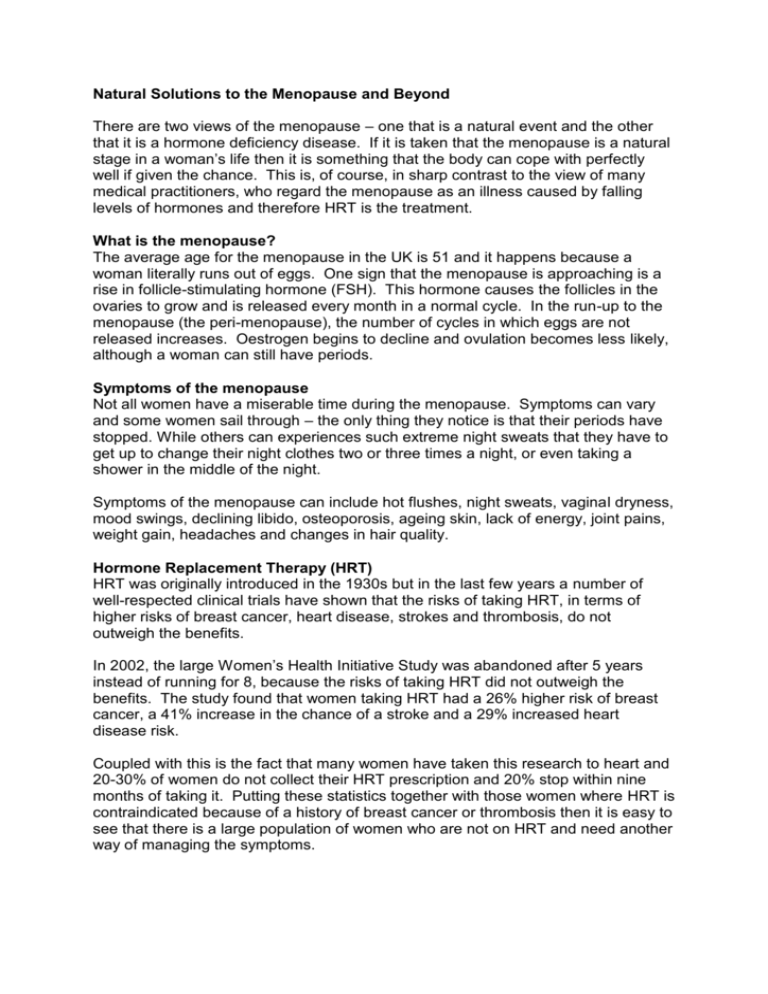
Natural Solutions to the Menopause and Beyond There are two views of the menopause – one that is a natural event and the other that it is a hormone deficiency disease. If it is taken that the menopause is a natural stage in a woman’s life then it is something that the body can cope with perfectly well if given the chance. This is, of course, in sharp contrast to the view of many medical practitioners, who regard the menopause as an illness caused by falling levels of hormones and therefore HRT is the treatment. What is the menopause? The average age for the menopause in the UK is 51 and it happens because a woman literally runs out of eggs. One sign that the menopause is approaching is a rise in follicle-stimulating hormone (FSH). This hormone causes the follicles in the ovaries to grow and is released every month in a normal cycle. In the run-up to the menopause (the peri-menopause), the number of cycles in which eggs are not released increases. Oestrogen begins to decline and ovulation becomes less likely, although a woman can still have periods. Symptoms of the menopause Not all women have a miserable time during the menopause. Symptoms can vary and some women sail through – the only thing they notice is that their periods have stopped. While others can experiences such extreme night sweats that they have to get up to change their night clothes two or three times a night, or even taking a shower in the middle of the night. Symptoms of the menopause can include hot flushes, night sweats, vaginal dryness, mood swings, declining libido, osteoporosis, ageing skin, lack of energy, joint pains, weight gain, headaches and changes in hair quality. Hormone Replacement Therapy (HRT) HRT was originally introduced in the 1930s but in the last few years a number of well-respected clinical trials have shown that the risks of taking HRT, in terms of higher risks of breast cancer, heart disease, strokes and thrombosis, do not outweigh the benefits. In 2002, the large Women’s Health Initiative Study was abandoned after 5 years instead of running for 8, because the risks of taking HRT did not outweigh the benefits. The study found that women taking HRT had a 26% higher risk of breast cancer, a 41% increase in the chance of a stroke and a 29% increased heart disease risk. Coupled with this is the fact that many women have taken this research to heart and 20-30% of women do not collect their HRT prescription and 20% stop within nine months of taking it. Putting these statistics together with those women where HRT is contraindicated because of a history of breast cancer or thrombosis then it is easy to see that there is a large population of women who are not on HRT and need another way of managing the symptoms. There is also a proportion of women who want to manage the menopause without drugs. They view the menopause as a natural event and are looking to treat the menopausal symptoms with natural remedies. Also contrary to popular myths, a study in the New England Journal of Medicine, in 2003, showed that there was no significant different between women taking HRT versus a placebo in terms of quality of life. Those taking HRT did not report sleeping better, more energy, less depression, better general health or more sexual satisfaction. Women need to know what choices they have around the menopause and if they knew there were safe, effective and natural remedies that can help combat the hot flushes and night sweats, they would not want to put themselves at risk of getting breast cancer, heart disease and/or blood clots by taking HRT? Dietary changes A well-balanced diet is essential during the menopause as it enables the body to adjust automatically to the hormone changes. Eating a good amount of fresh fruit and vegetables and also including phytoestrogens in the form of chickpeas, lentils, soya, kidney beans etc. is important. Caffeine in tea and coffee etc. can bring on a hot flush for many women. The same can apply to spicy foods and alcohol. Phytoestrogens One of the questions that most perplexes scientists is why and how the menopause is experienced so differently around the world. Up to 85% of Western women will experience hot flushes compared to only 14% in some Asian countries. As a result, scientists have been studying the benefits of a group of plant hormones known as phytoestrogens which occur naturally in certain foods such as soya, chickpeas, lentils. etc. Almost all fruit, vegetables and grains contain phytoestrogens in varying strengths but it is the isoflavones (one of the classes of phytoestrogens) that are the most beneficial kind. They are found in legumes such as soya, lentils, chickpeas etc. In the human gut, bacteria convert isoflavones into substances that have an oestrogenic action, although they are not themselves hormones which is why fermented soya foods such as miso and tempeh are thought to be especially beneficial. An average Japanese woman’s daily intake of isoflavones is between 20 and 80mg per day, Asian women’ diets about 45mg per day, while American and British women generally consume between 1-3mg per day. Also linked to this issue is the fact that in some parts of the world, notably the Far East, breast cancer is not the major killer it is here in the West. The UK seems to have a breast cancer death rate which is about six times higher than that of women in Japan. Studies conducted in the USA have shown that when Japanese women move to the West, they develop more cases of breast cancer. The level then rises to one similar to that seen here. Many experts think the main factor is diet and this borne out by the fact that as the traditional Japanese diet becomes more Westernised, cases of breast cancer is increasing among Japanese women in Japan itself. At the same time as the clinical trials are showing beneficial effects of consuming phytoestrogens, there has also been some negative press claiming that soya can accelerate brain ageing, lead to thyroid problems and cause reproductive problems. Unfortunately, most of this research is unpublished and has been conducted on animals. Also the studies have tended to use soya protein isolate rather than soya wholefoods. There are a number of key points which should be emphasised for menopausal women. These include: Stabilise blood sugar levels by reducing the amount of sugar and refined foods in the diet and eating little and often to reduce the toll on the adrenal glands Reduce or eliminate caffeinated drinks such as tea and coffee which contribute to the blood sugar problem but also act as diuretics depriving the body of vital nutrients and trace elements Ensure a good intake of essential fatty acids from oily fish, nuts and seeds which help lubricate the joints, skin and vagina Avoid soft fizzy drinks which contain high levels of phosphorus and increase the risk of osteoporosis by increasing urinary calcium excretion Include a good intake of phytoestrogens in the diet from many sources and not just soya Vitamins and Minerals Women are not getting everything they need from their food. The National Diet and Nutrition Survey which looked at adults aged 19-64 showed that only 15% of women actually achieved the five-a-day target for fruit and vegetables. With vitamin and minerals, 74% of women failed to achieve the Reference Nutrient Intake (RNI) for magnesium, 45% for zinc, 84% for folic acid and 15% for vitamin D, which are all important nutrients for women around the menopause and in the prevention of osteoporosis. So as well as eating a healthy diet, supplementation is beneficial during the menopause not only to ensure adequate nutrients for maintaining healthy bones but many can also help with the menopausal symptoms. A good quality multivitamin and mineral, designed for the menopause, should form the foundation of the supplement programme (the one I use in the clinic is NHP’s MenoSupport available from Hanover Health Shop). And then particular emphasis should be put on the following nutrients: Vitamin E This is an important vitamin to consider at the menopause. Over many years clinical studies have shown its effect on reducing hot flushes and night sweats. Vitamin E is also helpful for vaginal dryness and one study showed that just 400iu taken daily for between 1 and 4 months helped 50 percent of the women taking the vitamin E supplement. Vitamin C Vitamin C is known for its beneficial effect on the immune system, strengthening blood vessels and also for its role as an antioxidant in the body. So not only is Vitamin C important for preventing illness, and for encouraging your health in general, but it also has specific benefits at the menopause. Giving women vitamin C with bioflavonoids has been shown to help reduce hot flushes. Vitamin C helps to build up collagen which gives skin its elasticity and it is therefore helpful in the prevention and treatment of vaginal dryness (which can cause discomfort when the vagina loses some of its 'stretch'). It can also help retain the elasticity in the urinary tract and so prevent leakage or stress incontinence, which is common at the menopause. Collagen is also important for your bones. B Vitamins These are called the 'stress' vitamins because they are enormously beneficial when you are under a great deal of pressure. Symptoms of B-vitamin deficiency include anxiety, tension, irritability, lack of energy and poor concentration which are often symptoms associated with the peri-menopause. Omega 3 fatty acids Signs of an essential acid deficiency are dry skin, lifeless hair, cracked nails, fatigue, depression, dry eyes, lack of motivation, aching joint, difficulty in losing weight, forgetfulness, breast pain - all symptoms that could be 'blamed' on the menopause. They need to be supplemented around the menopause because they can help with many of the symptoms. Furthermore, because they help to 'lubricate' the body in general, they can help with vaginal dryness. Magnesium Magnesium is known as 'nature's tranquilliser', so it can help with symptoms such as anxiety, irritability and other mood changes in the menopause. But magnesium is also an important mineral in relation to bone health at the menopause as magnesium helps to metabolise both calcium and vitamin C and to convert vitamin D into the active form needed to ensure efficient absorption of calcium. Herbs There are a number of herbs that have traditionally been used at the menopause. Black cohosh From all the published research, the herb that has the most dramatic effect on hot flushes and night sweats is black cohosh. It was originally used by Native North Americans and is very effective in helping with hormonal imbalances. It has a generally calming effect on the nervous system and as well as the hot flushes and night sweats and can be helpful with other symptoms include anxiety, tension and depression. Other useful herbs at the menopause include agnus castus, dong quai, sage and milk thistle. It is better to get organic herbs where possible. (A good combination of these herbs is NHP’s Black Cohosh Support available from Hanover Health Shop.) Conclusion Women can now live 30 to 50 years past the menopause and you want to live those years in good health and free from symptoms. By eating well, taking appropriate supplements and exercising, your health will improve, which enhances the quality of your life. Good nutrition together with the right supplements, enables the body to adjust to the changes at the menopause automatically and keeps the skin and hair soft, minimises aching joints and stiffness, slows the ageing process, controls weight naturally without dieting, maintains libido and helps to prevent osteoporosis, heart disease and cancer. Dr Marilyn Glenville PhD is the UK’s leading nutritionist specialising in women’s health. She is the former President of the Forum for Food and Health at the Royal Society of Medicine and a registered nutritionist. Dr Glenville is the author of a number of internationally best selling books including ‘Fat around the Middle’, ‘Natural Solutions to the Menopause’ ‘Getting Pregnant Faster’ and The Natural Health Bible for Women’. She works in a gynaecology clinic in London. For more in depth information look on Marilyn’s website www.marilynglenville.com. If you are interested in a consultation in person or by telephone you can contact Dr Glenville’s clinic on 0870 5329244 or by email: health@marilynglenville.com.
